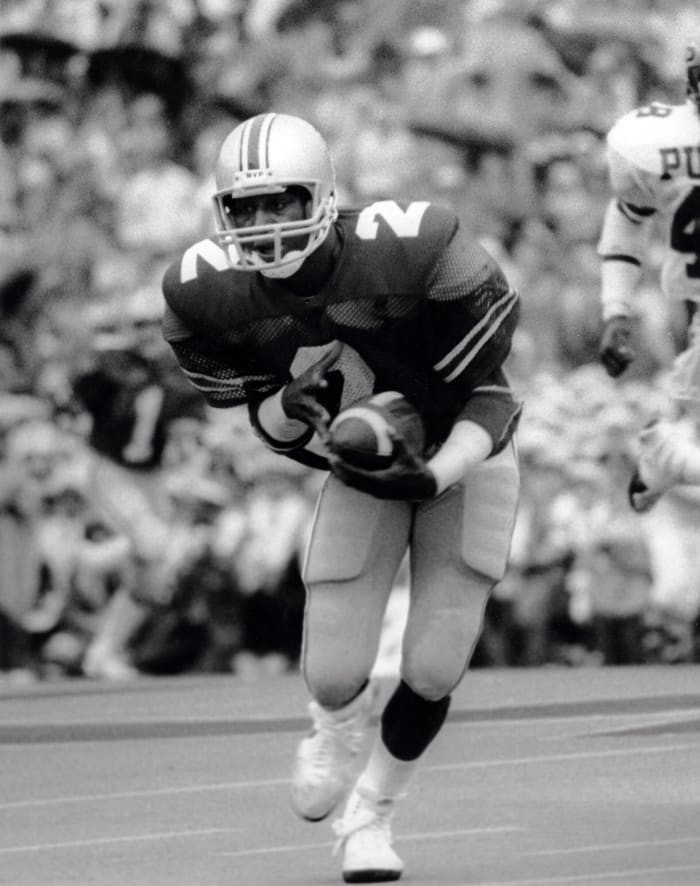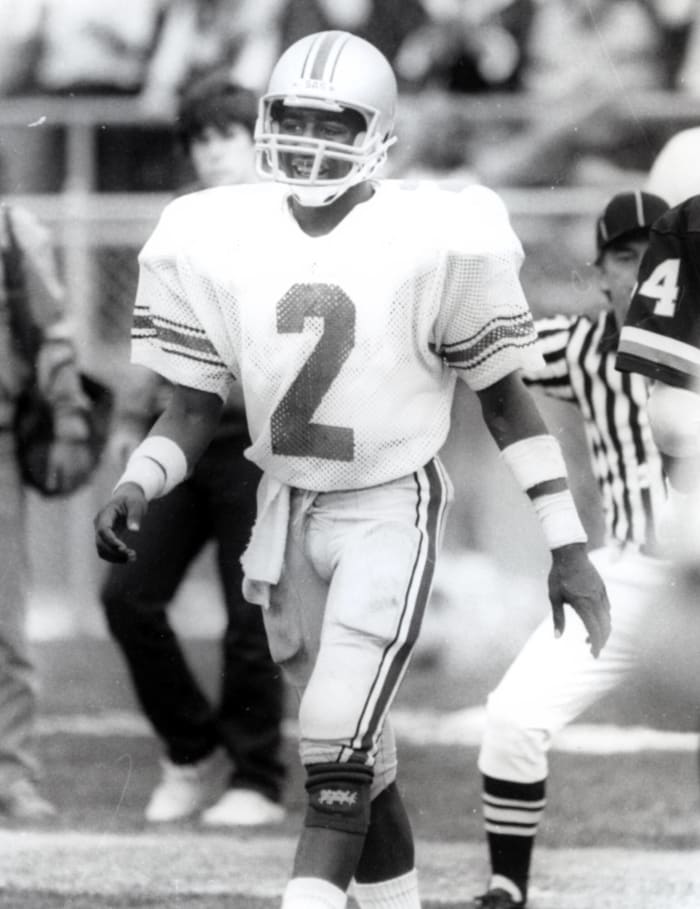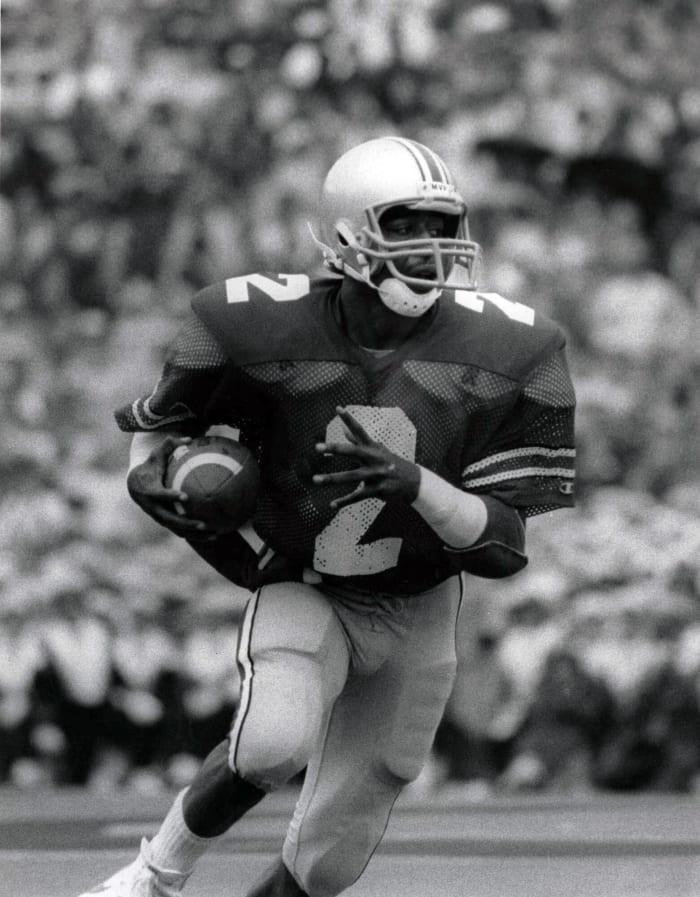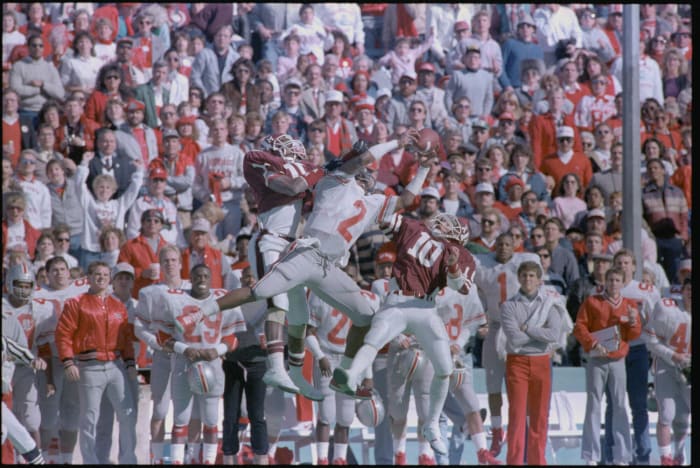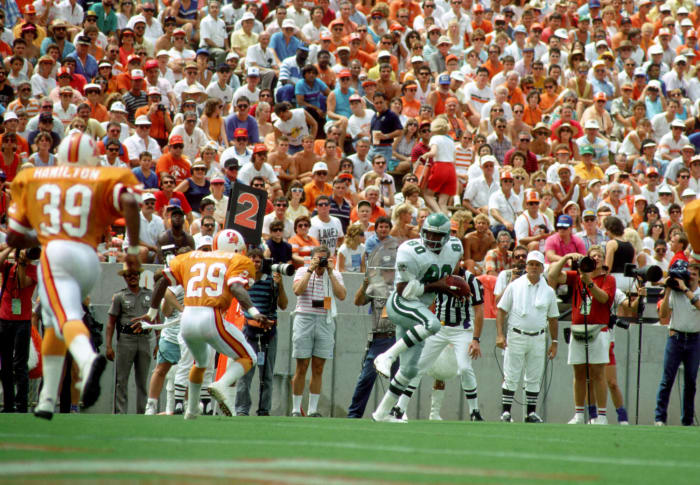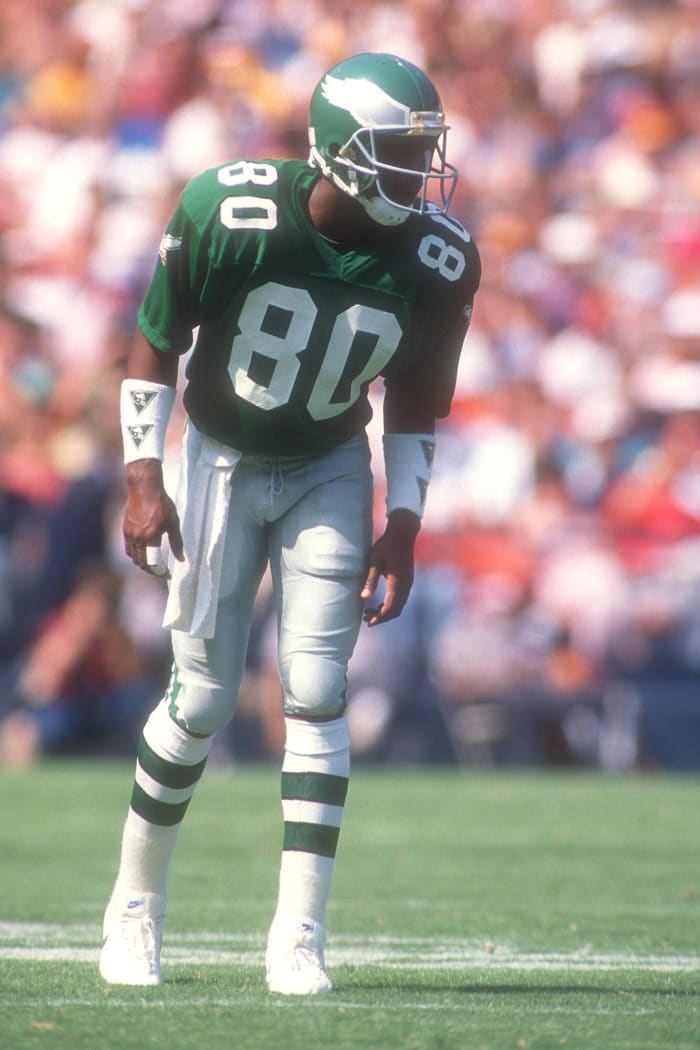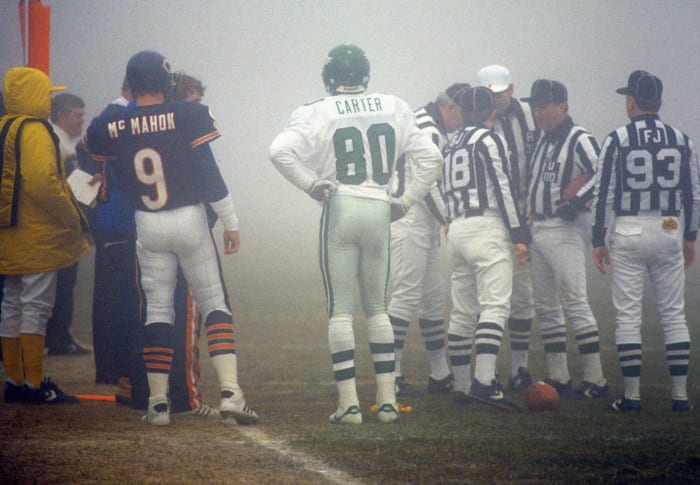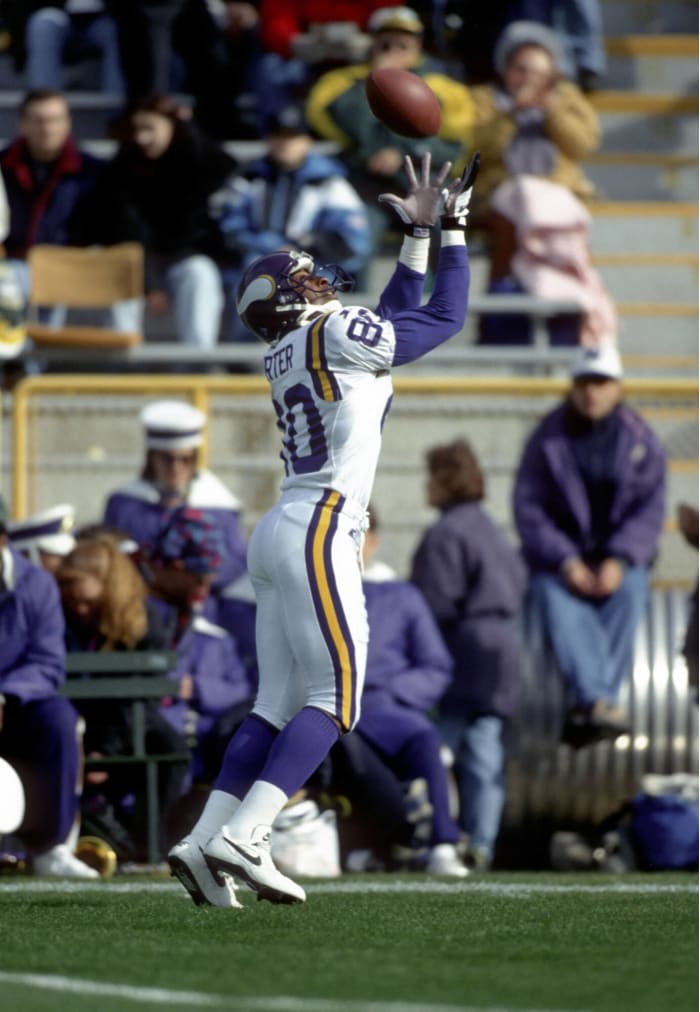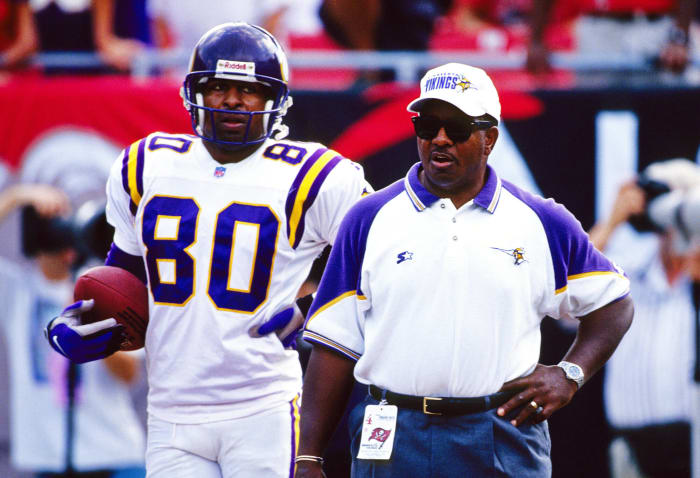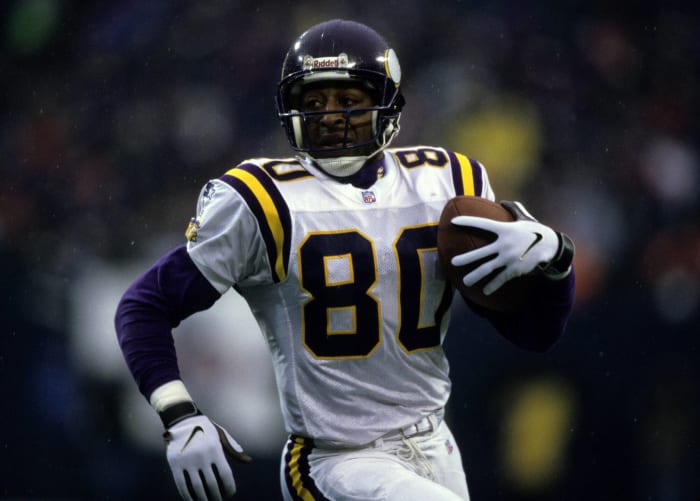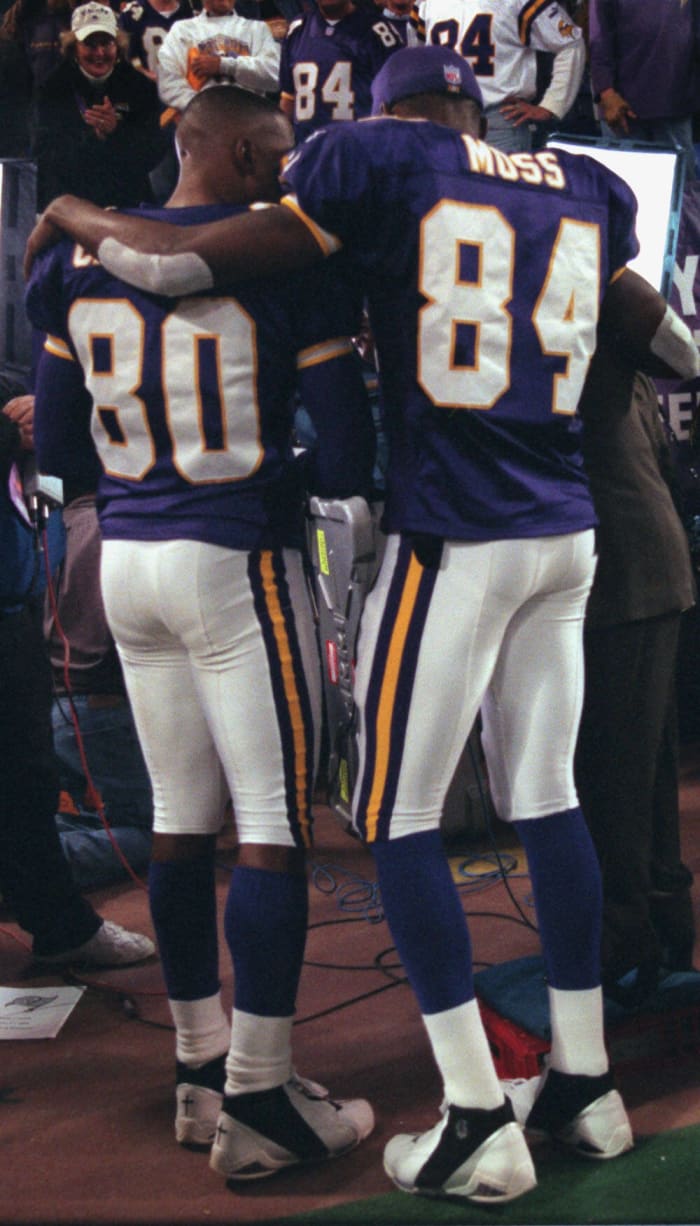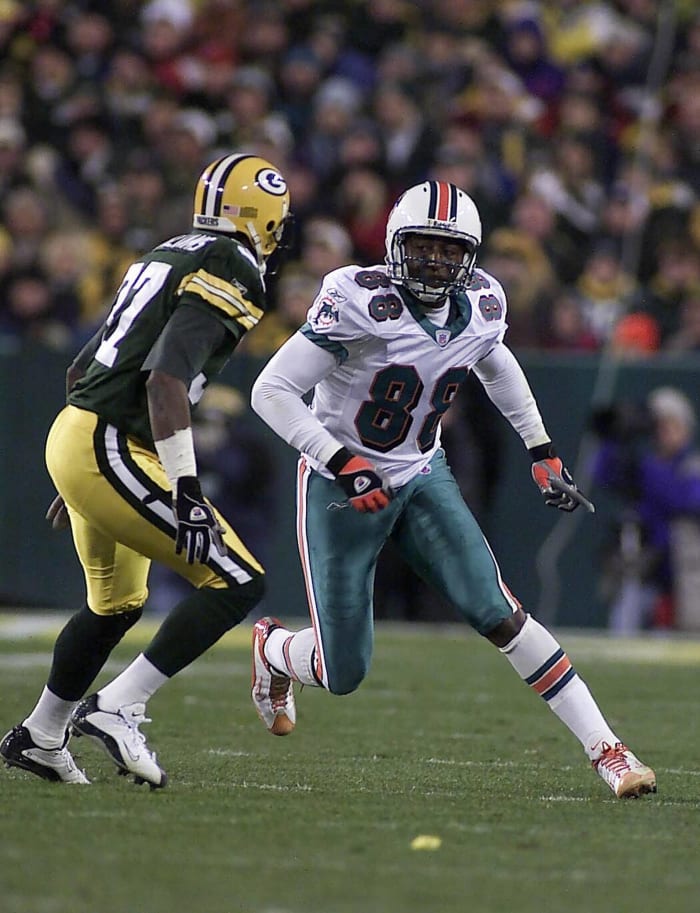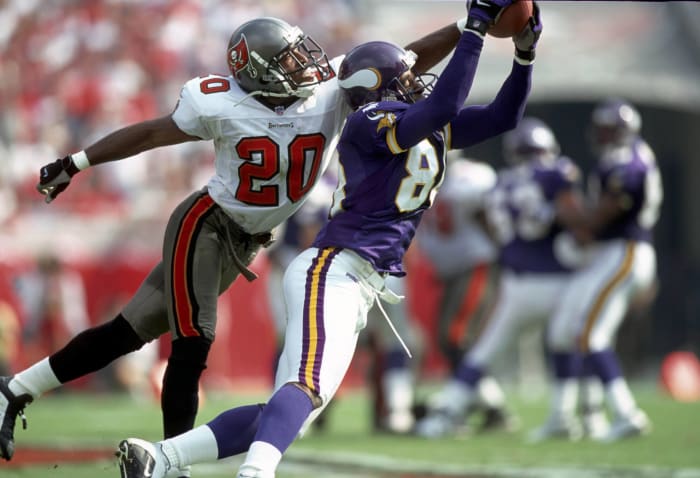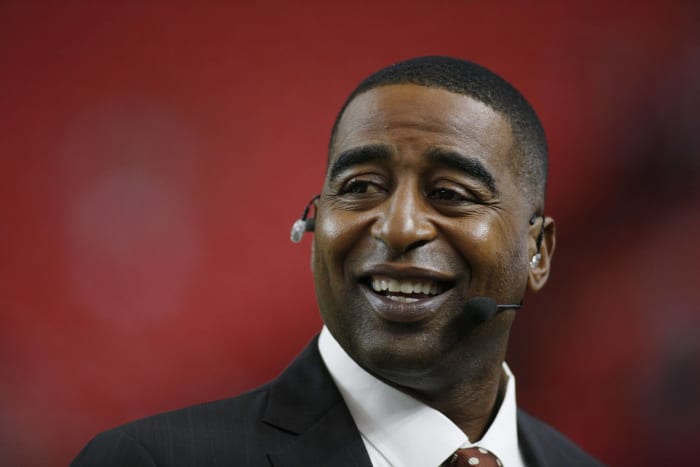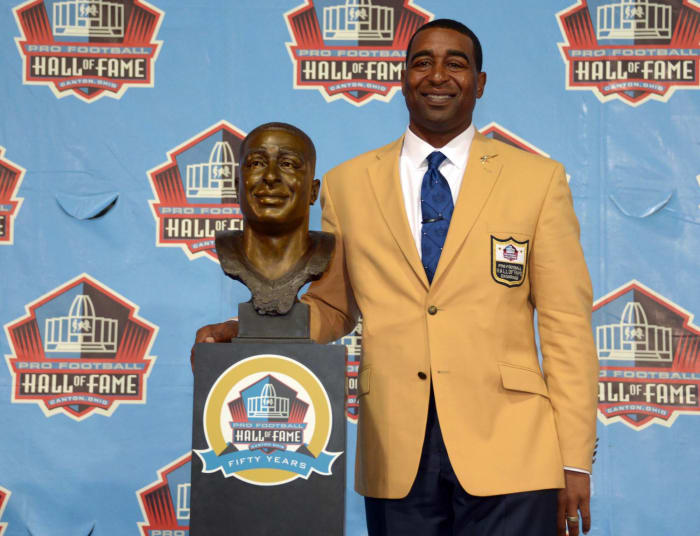Hall of Fame wide receiver Cris Carter had to endure a wave of adversity before becoming one of the greatest wide receivers of all time. He was deemed ineligible during his senior year at Ohio State, suffered from drug addiction during his tenure with the Philadelphia Eagles, and was eventually cut by the team. His NFL career hung in the balance. Eventually, Carter overcame adversity and made his comeback with the Minnesota Vikings. He went from being trapped by the temptations of addiction to the Pro Football Hall of Fame in Canton, Ohio. Let’s take a look at his inspiring story.
1 of 20
Becoming a hometown hero at Middletown High School
Malcolm Emmons-USA TODAY Sports
Cris Carter was born in Troy, Ohio, and raised in Middletown, Ohio. He grew up in a bad part of town and lived with his mom, Joyce Carter, and his brother, Butch Carter, who played in the NBA. His dad left the family when he was young, and Cris viewed Butch as a fatherly figure and inspiration. At Middletown High School, Cris played football and basketball. He gained the attention of some of the top college football programs in the nation. After a great high school career, he committed to Ohio State University.
2 of 20
College days at Ohio State
Malcolm Emmons-USA TODAY Sports
Carter considered playing football and basketball at Ohio State. After his freshman year, he stuck with football and dedicated himself to becoming the best. In 1984, he caught eight touchdowns as a true freshman and helped the Buckeyes earn a 9-3 record and a Rose Bowl appearance, where they lost. The following year, Carter caught eight touchdowns again as the Buckeyes won the Cotton Bowl.
3 of 20
Becoming an All-American
Malcolm Emmons-USA TODAY Sports
Carter’s best year in college was his junior year, hauling in 69 catches for 1,127 yards and 11 touchdowns — good enough for All-American honors. The Buckeyes won the Cotton Bowl.
4 of 20
Ruled ineligible for senior year
Bettmann-Contributor-Getty Images
It seemed Carter was placing himself among the best receivers in the country. Then, trouble came knocking.
The Buckeyes suspended him for marijuana use. After the fact, he was ruled ineligible by the NCAA for signing a contract with sports agent Norby Walters, who had affiliations with mobster Michael Franzese. The Buckeyes had a disappointing season in 1987, and Buckeyes head coach Earle Bruce was fired after the season.
5 of 20
Drafted by the Philadelphia Eagles
RVR Photos-USA TODAY Sports
Seen as a troubled player with potential, Carter fell to the fourth round of the 1987 NFL Supplemental Draft, where the Philadelphia Eagles drafted him. While Carter was overjoyed at the fact he was living his dream, it seemed he couldn’t stay away from trouble off the field.
6 of 20
Tenure with the Eagles
Mitchell Layton-Contributor-Getty Images
Carter showed flashes of greatness with the Eagles. His first career catch was a touchdown. He quickly became Eagles quarterback Randall Cunningham’s favorite target. He also became a solid red-zone threat. In his final year in Philly, Carter caught 45 passes for 605 yards and 11 touchdowns.
7 of 20
Carter's addictions threaten career
RVR Photos-USA TODAY Sports
Even though Carter became the Eagles’ best receiver on the field, he struggled with substance abuse. He failed a drug test for the Eagles and tested positive for cocaine. He made a bad habit out of partying and was addicted to alcohol, cocaine, and marijuana. While he masked these off-field problems with stellar play, the Eagles were at their wit’s end with the young receiver’s antics.
8 of 20
Cut by the Philadelphia Eagles
RVR Photos-USA TODAY Sports
In 1989, Eagles head coach Buddy Ryan cut Carter because of his substance abuse. Ryan never disclosed why he cut Carter to the public, saying that "all he can do is catch touchdowns." His time with the Eagles was over, and it appeared his dream was slipping away as he hit the free agent market.
Manny Rubio-USA TODAY Sports
The Minnesota Vikings took a chance on the troubled wide receiver and signed him to a cheap contract. The Vikings were in dire need of a wide receiver, and Carter had what they were looking for. Carter had hopes that he could revive his career.
10 of 20
Carter makes his comeback
Manny Rubio-USA TODAY Sports
The Vikings gave Carter the resources he needed to succeed in life. With the help of the Vikings, his family, and his passion for football, Carter sought treatment for his addictions. With a great support group behind him, Carter’s play improved as he got sober. He really came into his own with the Vikings. The best part was that his best days were ahead of him.
11 of 20
Leading the league in receptions
RVR Photos-USA TODAY Sports
In 1994, Carter’s fourth year with the Vikings, he hauled in a league-leading 122 receptions for 1,256 yards and seven touchdowns. Carter made his second of eight Pro Bowls in a row. If you previously didn’t know Carter, you knew after this season. He was one of the league’s premier wide receivers at this stage of his career.
12 of 20
The Vikings become a perennial playoff contender with Carter
RVR Photos-USA TODAY Sports
Carter wasn’t the only one thriving. The Vikings enjoyed a period of success during his tenure with the team. The Vikings went to the playoffs in eight of his 12 seasons with the team. Not only did Carter revive his career with the Vikings, but he also helped the franchise that gave him a second chance to get back to prominence.
13 of 20
A touchdown machine
Star Tribune via Getty Images / Contributor
Carter led the league in receiving touchdowns three times (1995, '97, '99) and didn’t catch less than 10 receiving touchdowns from 1995-99. Carter retired with 130 career receiving touchdowns, the fourth most all-time, per Statmuse.
14 of 20
Hitting his prime at 30
RVR Photos-USA TODAY Sports
When most NFL wide receivers hit their 30s, it’s time to start considering their second career acts. Carter was a different breed. He hit his prime in his 30s and played pro football until retiring at 37 in 2002. From a statistical standout, Carter was better in his 30s than in his 20s.
15 of 20
One win away from the Super Bowl
Allen Kee-Contributor-Getty Images
The 1998 Vikings were the best team Carter played for in the NFL. Reunited with Randall Cunningham, his quarterback during his Eagles tenure, the Vikings offense reached new heights. They went 15-1 and had the best offense in the league. The playoffs led to more heartbreak for this snakebitten franchise. They lost in an upset defeat to the Atlanta Falcons in the NFC Championship Game on a last-second field goal. It was the closest Carter ever got to a Super Bowl.
16 of 20
The Carter & Moss duo
Star Tribune via Getty Images / Contributor
When the Vikings drafted Randy Moss out of Marshall in 1998, Carter knew he had to take him under his wing. Like Carter, Moss entered the league with a reputation as a troubled receiver with potential. Carter mentored Moss and taught him how to succeed in the NFL. Both are in the Pro Football Hall of Fame now.
Fun fact: Before Larry Fitzgerald was catching touchdowns for the Arizona Cardinals, he was the Vikings ball boy when Carter and Moss were around. Fitzgerald has said this experience was instrumental in his development into one of the greatest.
JEFF HANISCH-Contributor-Getty Images
After the Vikings went 5-11 in 2001, Carter abruptly retired. The Miami Dolphins lured him out of retirement and signed him halfway through the season to add depth to an injury-depleted wide receiver corps. It was his last team.
18 of 20
The many quarterbacks of Cris Carter
Paul Chapman-USA TODAY Sports
Imagine if Carter had the same quarterback his whole career. Carter never had the same quarterback for too long. During his time with the Vikings, he caught passes from Rich Gannon, Warren Moon, Jeff George, Randall Cunningham, and Dante Culpepper, among others. While great wide receivers like Jerry Rice and Marvin Harrison had the same quarterback, Carter made the most out of an assortment of quarterbacks varying in talent.
19 of 20
Life outside of football
Brett Davis-USA TODAY Sports
Carter became an NFL analyst after his football career. He has worked as an analyst for HBO, ESPN, and NFL Network. At one point, he hosted First Things First on Fox Sports with Nick Wright until 2019.
The Carters ate their Wheaties. His older brother, Butch, played in the NBA. Cris’ son, Duron, played football at Florida Atlantic and in the CFL after that.
Cris met his wife, Melanie, at Ohio State. Since retiring, Carter speaks at events for NFL rookies to tell them his story, so they don’t go down the same path he did.
20 of 20
A Hall of Fame life
Kirby Lee-USA TODAY Sports
Carter had to wait six years before getting the call from Canton. When it came in 2013, it was well worth the wait. Carter had reached football immortality. But he always remembered where he came from. He was the same kid from Middletown, Ohio, who had to fight for everything in his life. The same player who was banned from playing his senior year at Ohio State and almost lost his NFL career to drug addiction had made it to the Hall of Fame. While he never won a Super Bowl, Carter went down as one of the greatest wide receivers in NFL history.
David J. Hunt is a freelance writer based out of Philadelphia. He ran cross country at Penn State, became a volunteer firefighter during COVID-19, and is a self taught journalist. He's a diehard Philly sports fan. When he isn't watching sports, he enjoys working out, fishing, and traveling. You can find more of his writing at The Chestnut Hill Local and The Temple News. You can follow him on Twitter at @dave_hunt44.
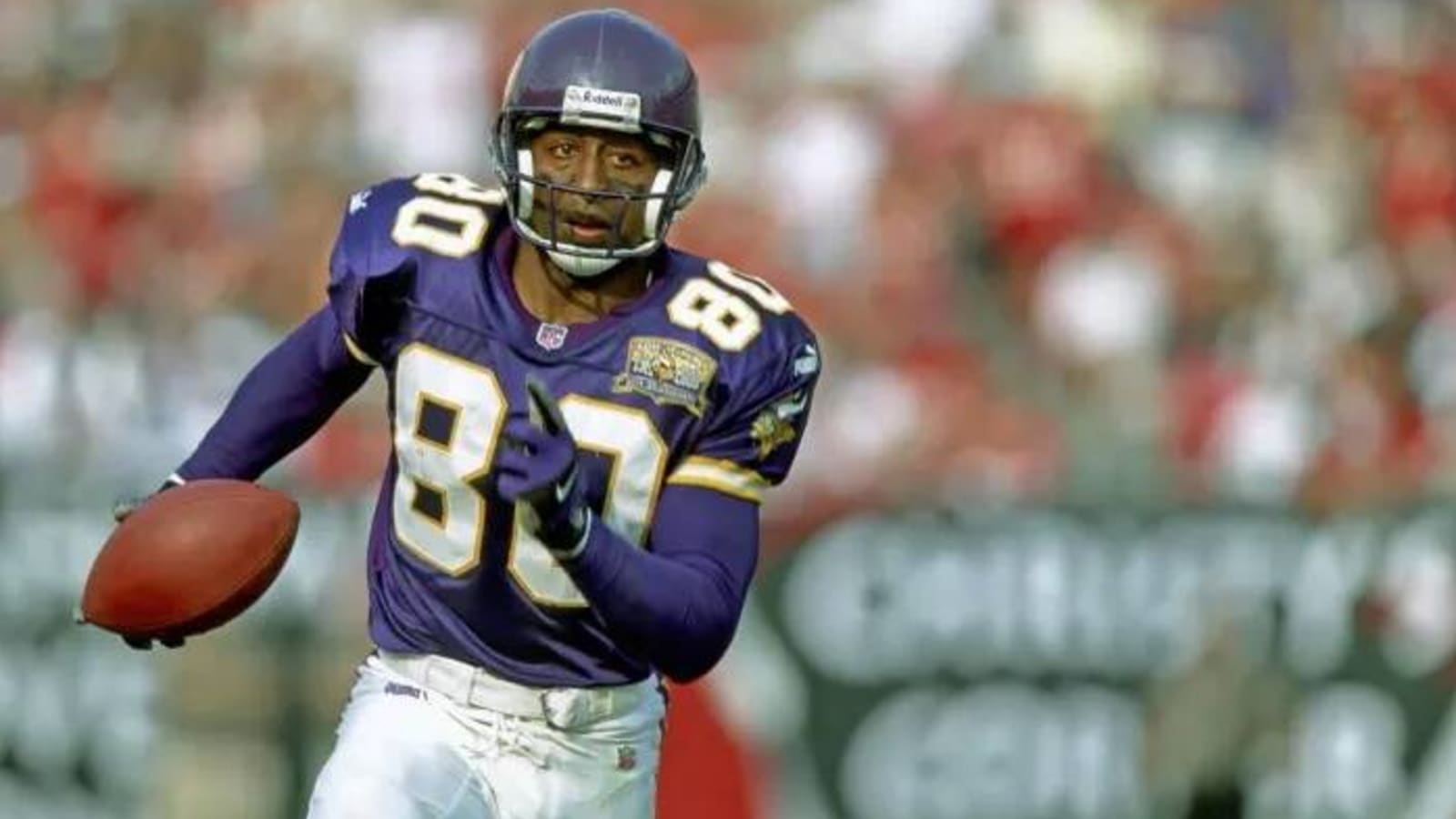
 +
+
